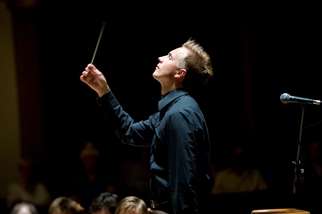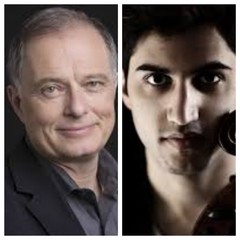|
Back
A mari usque ad astra New York
Isaac Stern Auditorium, Carnegie Hall
01/31/2022 -
Benjamin Britten: Four Sea Interludes from Peter Grimes, Opus 33a
Edward Elgar: Concerto for Cello and Orchestra in E Minor, Opus 85
Gustav Holst: The Planets, Opus 32
Kian Soltani (Cello)
Musica Sacra, Kent Tritle (Leader), Royal Philharmonic Orchestra, Vasily Petrenko (Music Director and Conductor) 
V. Petrenko (© Mark McNulty)
“I always said God was against art, and I still believe it.”
Sir Edward Elgar
“I was trained up in the English court,/Where being but young/Many an English ditty lovely well/And gave the tongue a helpful ornament.”
William Shakespeare, Henry IV, Part One
Vasily Petrenko is hardly the first conductor to fall in love Great Britain and Great Britain’s music. For the past 15 years, he was conductor of the Liverpool Philharmonic, as well as leading other orchestras internationally. Last year, he became Music Director of the Royal Phiharmonic Orchestra at the start of their second 75-year cycle.
And to prove the love of his de facto British life (he is still from the Russian Federation), the conductor brought three English works “from the sea (coast) to the stars (er...planets) to Carnegie Hall last night. In fact, three of the most popular Post-Romantic works from the first half of the 20th Century.
After a warm spoken introduction, he launched a quartet of Benjamin Britten’s Sea Interludes from Peter Grimes. My only regret is that we can’t see the whole opera, but Mr. Petrenko painted a most visual picture of the sea.
Rather, Britten painted his seacoast town with dark and vivid colors. No shining “Morning”, no happy church meeting and of course a frenzied storm.
So important and difficult are the various solos–like the shadows on a Turner seascape–that with the right performance, one can picture it all. The RPO has the right soloists: the flute cantilenas in “Dawn” was fleet. The quicksilver notes of “Sunday Morning”, against the group of French horns as church bells, was equally picturesque. “Moonlight” can often sag under a lugubrious weight, but Mr. Petrenko kept the orchestra moving right into the violent “Storm”.

K. Tritle/K. Soltani (© Manhattan School of Music/Belgrade Philharmonic)
The one soloist here was the young Iranian-Austrian cellist Kian Soltani, and he is an artist of undoubted gifts. Whether they fit the Elgar Cello Concerto is another story. While the Concerto (along with Dvorák’s work) is the most sensitive and passionate ever written (both with tragic stories behind them), it takes more than sensitivity to make it successful.
Mr. Soltani has the requisite technical force. But this is a work of a hundred moods, and the cellist seemed to avoid them.
The start, as bow bit into E minor chords, promised tragedy after tragedy. But, as any Shakespearean knows, tragedy is not flaccid: it is always strong. One can believe, like this writer, that the opening is more ominous than tragic. Yet Mr. Soltani, with few exceptions, retained a flaccid idea of tragedy. Outside of the scherzo, those semiquavers produced with clarity, almost friskiness, this was a moribund performance.
Elgar’s personal mood might have been unhappy, but his compositional mood was always lively. Mr. Soltani stretched out the emotional culminations. But the other moods had a monochromatic performance. The Concerto has sounds from whispers to whimpers, colors hard on the strings or–in Mr. Soltani’s case–carefully sensitive.
Such sensitivity is to be lauded. But during the body of the work, it often replaced Elgar’s mixture of moods and melodies.
After the intermission, Maestro Petrenko showed that he has more than Rostropovich and Shostakovich in a love of British music. He took Gustav Holsts seven Planets (earth was out of bounds, Pluto had not been discovered in 1917), and pushed the immense consorts of blazoning brass, violent percussion, woodwind cadenzas to the extremes.
True, Holst had once titled the work Seven Pieces for Large Orchestra. That though was modest nonsense. Mars was war, and Holst’s ascents and descents of horns and drums was so barbaric–or possibly in Mr. Petrenko’s terms Scythian–that it made Richard Strauss’ Heldenleben war seem like a lullaby.
I’ve never been a fan of “Venus”, and not even Mr. Petrenko’s brilliance could bring this insipid peace-pean to fruition. After this, it was All Systems Go, with the Gargantuan laughter of “Jupiter”, the antediluvian “Saturn”, and the magic of Uranus, the drums and brass separating and joining.
When the stage doors opened, Kent Tritle was glimpsed conducting Musica Sacra into the wordless “Neptune”, a watery god with limpid tones.
Yes, Gustav Holst was a prodigious and prolific composer. But his other pieces are more cerebral. He was an atheist with a mystical streak, and his music enveloped all his persona. And while not a monger of war, I am plebeian enough to love “The Bringer of war” above all.
Mr. Petrenko broke his Albion affection with one mysterious Russian encore. That is, it was a romp like a marriage of Glinka and Smetana, and nobody in the audience could recognize it. Carnegie Hall revealed that this was the “Tumbler’s Dance” from Tchaikovsky’s Snow Maiden. Did I write Tchaikovsky? Not Rimsky? Yes, Tchaikovsky wrote it first–and was furious that Rimsky-Korsakov had “stolen” the story from him.
This never bothered the conductor, who took the Royal Philharmonic on a robust ride happily belying their regal name.
Harry Rolnick
|